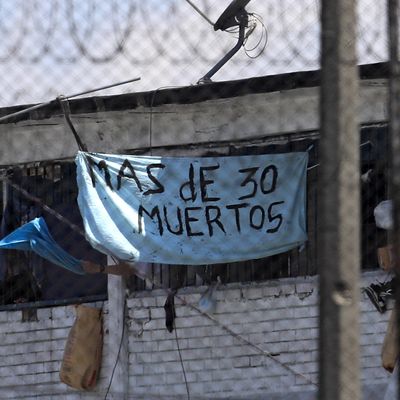
By many estimates, the United States is still weeks away from seeing the worst of the novel coronavirus. The illness’s rapid spread, along with expanded testing, are producing higher and more comprehensive infection counts, which currently outpace the rate increases seen in other hard-hit countries like Italy, Spain, and Iran. The death toll is climbing as hospitals become overwhelmed. Tuesday alone saw 13 COVID-19 fatalities at Elmhurst Hospital Center in New York, a city that’s become the epicenter of the U.S. outbreak. As a result, either by choice or official mandate, Americans have joined many of their counterparts the world over and shut themselves in their homes, making a common practice of stockpiling groceries and supplies and avoiding crowds in case things get worse before they get better.
A similar panic is being felt among the world’s incarcerated populations — only they have fewer options for protecting themselves. People in jails and prisons are especially vulnerable to the pandemic’s ravages. Crowded and often filthy conditions, paired with restricted access to soap, water, and hand sanitizer have made unavailable to them many of the precautions that experts say can stem the virus’s spread: social distancing, staying away from infected people, and maintaining fastidious personal hygiene. Yet even as the virus infiltrates the world’s correctional facilities, officials in many countries, including the U.S., have been perilously slow to implement emergency countermeasures, like large-scale decarceration. The result is millions of prisoners stuck in cages essentially waiting for the deadly illness to pick them off. Some have responded with among the few defenses left at their disposal: protests, strikes, riots, and escape attempts.
The result has been a global surge in dissent. Two weeks ago, nearly 1,000 prisoners escaped detention in the Brazilian state of São Paolo after authorities canceled furloughs and visits in an effort to stop the coronavirus from spreading. Rather than live under lockdown in de facto petri dishes, many decided their best option was to bolt; facilities that saw breakouts included prisons in Tremembé, Porto Feliz, Mirandópolis, and Mongaguá, according to the Guardian. Riots fueled by virus fears have similarly been reported in Peru and Chile, and resulted in five prisoners being killed by guards in Venezuela last week, according to the Washington Post. The deadliest so far have occurred in Colombia. At least 23 inmates were killed in clashes with prison authorities over the weekend, according to the New York Times. People locked inside La Modelo, a prison in the capital city of Bogotá, had been complaining about unhygienic conditions and inadequate measures taken by officials to protect them. Authorities denied the charges and characterized the violence as stemming from a “criminal” mass escape attempt. One inmate, Oscar Sanchez, described the crackdown that greeted them as “a massacre that until now has taken more lives than coronavirus in [this country].” (Columbia has 491 confirmed cases of the coronavirus and six deaths, but none inside La Modelo as of this writing.)
Since last week in France, more than two dozen prisoners have refused to return to their crowded cells after courtyard walks, citing coronavirus concerns. More coordinated actions are happening in the U.S. According to ProPublica, ICE detainees being held at the Hudson County Correctional Facility in New Jersey have gone on hunger strike, demanding access to soap and toilet paper. (In doing so, they join prisoners at two other immigration detention facilities in New Jersey carrying out similar protests.) And at New York’s Rikers Island jail complex, where more than 50 inmates have tested positive for the coronavirus, a department probe team — the jail equivalent of a SWAT unit — pepper-sprayed eight prisoners who refused to return to their cells over the weekend, The City reports. The prisoners were asking to be admitted to a jail clinic to get their temperatures checked. A fellow prisoner who handled food had recently been removed from their housing unit after exhibiting flulike symptoms. The unrest continued into the week, when two dormitories housing about 48 prisoners each refused to go to work or the mess hall in protest against their conditions.
Taken together, these actions vivify the terror and desperation being felt by prisoners — not just in the U.S. but worldwide. A mix of fanatical punitiveness and a callous disregard toward how much incarcerated people suffer under routine circumstances, to say nothing of during a pandemic, has made America’s jails and prisons into habitats of sustained torture. And they’re rivaled by conditions elsewhere. Many of Brazil’s prisons are so overcrowded and in such dismal condition that they experience deadly riots regularly — including two within the span of three months in 2019 that claimed more than 100 lives. Colombia’s prison system, which is similarly bloated, is at more than 150 percent capacity. Many of Venezuela’s prisons are marked by cells so packed and sparse and exposed to the elements that inmates sleep on floors, go without shirts and shoes to combat the oppressive heat, and often lack bathrooms. Indeed, there are few correctional facilities in the world that don’t pose a dramatically heightened risk for the spread of the coronavirus compared to what society outside of them is being exposed to. A crucial difference is that prisoners lack the same luxury of voluntary self-preservation. They are trapped and desperate. If authorities aren’t going to protect them as the virus takes its deadly toll, it’s no surprise that they’re protecting themselves.






























